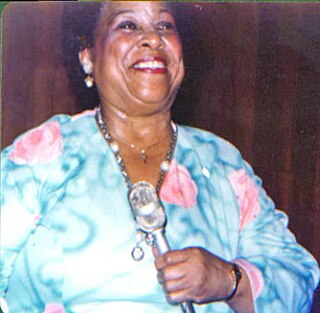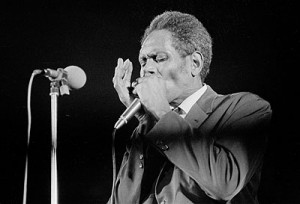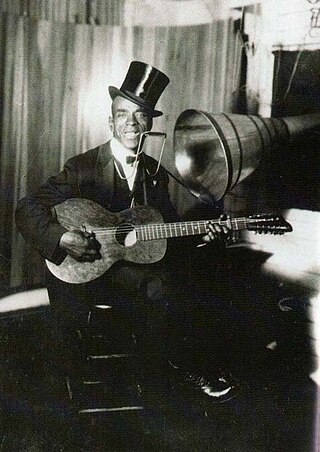Related Research Articles

A jug band is a band employing a jug player and a mix of conventional and homemade instruments. These homemade instruments are ordinary objects adapted to or modified for making sound, like the washtub bass, washboard, spoons, bones, stovepipe, jew's harp, and comb and tissue paper. The term jug band is loosely used in referring to ensembles that also incorporate homemade instruments but that are more accurately called skiffle bands, spasm bands, or juke bands because they do not include a jug player.

Otis Spann was an American blues musician, whom many consider to be the leading postwar Chicago blues pianist.

Ida M. Cox was an American singer and vaudeville performer, best known for her blues performances and recordings. She was billed as "The Uncrowned Queen of the Blues".

Helen Humes was an American singer. Humes was a teenage blues singer, a vocalist with Count Basie's band, a saucy R&B diva, and a mature interpreter of the classic popular song.

Walter Horton (April 6, 1921 – December 8, 1981), known as Big Walter (Horton) or Walter 'Shakey' Horton, was an American blues harmonica player. A quiet, unassuming, shy man, he is remembered as one of the premier harmonica players in the history of blues. Willie Dixon once called Horton 'the best harmonica player I ever heard'.
The Memphis Jug Band was an American musical group active from the mid-1920s to the late-1950s. The band featured harmonica, kazoo, fiddle and mandolin or banjolin, backed by guitar, piano, washboard, washtub bass and jug. They played slow blues, pop songs, humorous songs and upbeat dance numbers with jazz and string band flavors. The band made the first commercial recordings in Memphis, Tennessee, and recorded more sides than any other prewar jug band.

Noah Lewis was an American jug band and country blues musician, generally known for playing the harmonica.

William Shade Jr., known as Will Shade, was a Memphis blues musician, best known for his leadership of the Memphis Jug Band. He was commonly called Son Brimmer, a nickname from his grandmother Annie Brimmer. The name apparently stuck when other members of the band noticed that the sun bothered him and he used the brim of a hat to shade his eyes.

"Sweet Home Chicago" is a blues standard first recorded by Robert Johnson in 1936. Although he is often credited as the songwriter, several songs have been identified as precedents. The song has become a popular anthem for the city of Chicago despite ambiguity in Johnson's original lyrics. Numerous artists have interpreted the song in a variety of styles.

"My Melancholy Baby" is a popular song published in 1912 and first sung publicly by William Frawley. The music was written by Ernie Burnett (1884–1959), the lyrics by George A. Norton.

Jim Kweskin is an American folk, jazz, and blues musician, most notable as the founder of the Jim Kweskin jug band, also known as Jim Kweskin and the Jug Band, with Fritz Richmond, Geoff Muldaur, Bob Siggins and Bruno Wolfe. The Jug Band was a significant part of the folk and blues revival of the 1960s. Maria Muldaur, formerly with the Even Dozen Jug Band, joined the band in 1963. During the five years they were together, the Jug Band successfully modernized the sounds of pre–World War II rural music.

Johnny Watson was an American blues singer, guitarist and harmonica player, best known for his recordings under the name Daddy Stovepipe. Watson also recorded as Jimmy Watson, Sunny Jim and Rev. Alfred Pitts. He may have been the earliest-born blues performer to record.
"Road Runner" is a 12-bar blues song performed by American rock and roll performer Bo Diddley, originally released as a single by Checker Records in January 1960, and later released on the LP record Bo Diddley in the Spotlight. The song reached #20 on Billboard magazine's Hot R&B Sides chart, and #75 on the Hot 100. The song has since been recorded by many artists.

The Even Dozen Jug Band is the debut and only studio album by the American jug band Even Dozen Jug Band, released in 1964.
"Early in the Morning" is a blues song that was recorded by Sonny Boy Williamson I in 1937. Identified as one of his most successful and influential tunes, it was inspired by earlier blues songs. "Early in the Morning" has been recorded by various musicians, including Junior Wells, who made it part of his repertoire.
"My Bucket's Got a Hole in It" is a song widely attributed to Clarence Williams, who obtained a copyright in 1933, although the melody was recorded under various names years earlier. The song became popular performed by Hank Williams for MGM and reached number 4 on the country chart in 1949.
"We Gonna Move to the Outskirts of Town" is a song originally recorded on September 3, 1936, by Piedmont blues musician Casey Bill Weldon. Weldon performed it as a solo piece, with vocals and acoustic guitar plus piano and double bass accompaniment.
Stovepipe No. 1, born probably Samuel Chambers Jones was an American blues musician and songster, active in the Cincinnati area of the United States. He made his first recordings in 1924.

American Epic: The Best of the Memphis Jug Band is a compilation album released to accompany the award-winning American Epic documentary film series. It collects performances from the Memphis Jug Band's career-spanning recording sessions for Victor Records and OKeh Records between 1927 and 1934. The album was released as a 15-track download and a vinyl LP.
Clement W. Triplett who was known professionally as Dusty Brown, was an American electric blues harmonica player, singer and songwriter. Over a long career, he variously worked with Muddy Waters, Little Walter, Sunnyland Slim, Hip Linkchain, Eddie Cusic, Little Son Joe, Howlin' Wolf, Bobby Rush, Henry Gray, Luther "Snake Boy" Johnson, Lonnie Johnson, Sonny Thompson and Buddy Guy.
References
- ↑ "40. "Newport Blues" by the Cincinnati Jug Band". oldweirdamerica.com. Retrieved March 30, 2016.
- 1 2 Lewis, Dave. "Stovepipe No. 1 – Biography". allmusic.com. Retrieved March 30, 2016.
- 1 2 Lewis, Dave. "Cincinnati Jug Band – Biography". allmusic.com. Retrieved March 30, 2016.
- ↑ "Cincinnati Jug Band". redhotjazz.com. Retrieved March 31, 2016.
- ↑ Tracy, Steven (1999). Going to Cincinnati: A History of the Blues in the Queen City. University of Illinois Press. p. 39. ISBN 0252019997.
- ↑ Tracy, Steven (1999). Going to Cincinnati: A History of the Blues in the Queen City. University of Illinois Press. pp. 40–41. ISBN 0252019997.
- 1 2 Smith, Harry (1997). "Anthology of American Folk Music (CD booklet)". Smithsonian Folkways.
{{cite web}}: Missing or empty|url=(help) - ↑ "Cincinnati Jug Band discography". discogs.com. Retrieved March 31, 2016.